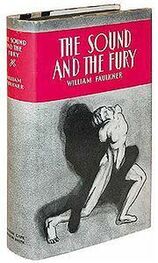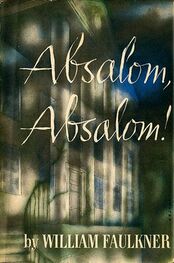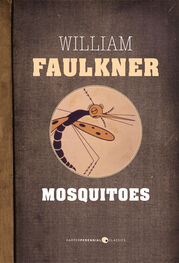Popeye began to jerk his neck forward in little jerks. “Psssst!” he said, the sound cutting sharp into the drone of the minister’s voice; “pssssst!” The sheriff looked at him; he quit jerking his neck and stood rigid, as though he had an egg balanced on his head. “Fix my hair, Jack,” he said.
“Sure,” the sheriff said. “I’ll fix it for you;” springing the trap.

It had been a gray day, a gray summer, a gray year. On the street old men wore overcoats, and in the Luxembourg Gardens as Temple and her father passed the women sat knitting in shawls and even the men playing croquet played in coats and capes, and in the sad gloom of the chestnut trees the dry click of balls, the random shouts of children, had that quality of autumn, gallant and evanescent and forlorn. From beyond the circle with its spurious Greek balustrade, clotted with movement, filled with a gray light of the same color and texture as the water which the fountain played into the pool, came a steady crash of music. They went on, passed the pool where the children and an old man in a shabby brown overcoat sailed toy boats, and entered the trees again and found seats. Immediately an old woman came with decrepit promptitude and collected four sous.
In the pavilion a band in the horizon blue of the army played Massenet and Scriabin, and Berlioz like a thin coating of tortured Tschaikovsky on a slice of stale bread, while the twilight dissolved in wet gleams from the branches, onto the pavilion and the sombre toadstools of umbrellas. Rich and resonant the brasses crashed and died in the thick green twilight, rolling over them in rich sad waves. Temple yawned behind her hand, then she took out a compact and opened it upon a face in miniature sullen and discontented and sad. Beside her her father sat, his hands crossed on the head of his stick, the rigid bar of his moustache beaded with moisture like frosted silver. She closed the compact and from beneath her smart new hat she seemed to follow with her eyes the waves of music, to dissolve into the dying brasses, across the pool and the opposite semicircle of trees where at sombre intervals the dead tranquil queens in stained marble mused, and on into the sky lying prone and vanquished in the embrace of the season of rain and death.
EDITORS’ NOTE

This volume reproduces the text of Sanctuary that has been established by Noel Polk. It is based on Faulkner’s own typescripts—both the original carbon typescript that was completed in May 1929 and the revisions that he typed and affixed to his galley proofs in the summer of 1930—which have been emended to account for his revisions in proof, his indisputable typing errors, and certain other mistakes and inconsistencies that clearly demand correction. All of Faulkner’s novels bear alterations of varying degrees of seriousness by his editors, but Sanctuary is without question the work that has been most heavily revised by the author himself.
Evidence from the holograph manuscript of Sanctuary makes clear that the book was heavily revised by the author in the initial writing process, with the manuscript showing hundreds of shifts of material within it. When, after a delay of some months, Faulkner received galley proofs from his publisher, he again went through the complex process of revising his work. Whether he did this because he thought it was “terrible,” as he claimed, or if there were perhaps other reasons for the revision, and whether he improved the novel in revision, are questions scholars are just now beginning to investigate.
Extant documents relevant to the editing of Sanctuary are the holograph manuscript, the carbon typescript, and a set of the original uncorrected galley proofs, all at the Alderman Library of the University of Virginia; the ribbon typescript setting copy, at the University of Mississippi; and the corrected galleys, at the Humanities Research Center of the University of Texas. The manuscript of Sanctuary bears the dates January–May 1929; the carbon typescript is dated, on the final page, May 25, 1929. The revisions in galley took place in the late summer of 1930. The novel was first published on February 9, 1931.
American English continues to fluctuate; for example, a word may be spelled more than one way, even in the same work. Commas are sometimes used expressively to suggest the movements of voice, and capitals are sometimes meant to give significances to a word beyond those it might have in its uncapitalized form. Since standardization would remove such effects, this volume preserves the spelling, punctuation, capitalization, and wording of the texts established by Noel Polk, which strive to be as faithful to Faulkner’s usage as surviving evidence permits.

The following notes were prepared by Joseph Blotner and are reprinted from Novels 1930–1935 , one volume of the edition of Faulkner’s collected works published by The Library of America, 1985. Numbers refer to page and line of the present volume (the line count includes chapter headings). For further information on Sanctuary , consult Sanctuary: The Original Text , edited, with an Afterword and Notes, by Noel Polk (New York: Random House, 1981); Gerald Langford, Faulkner’s Revision of “Sanctuary”: A Collation of the Unrevised Galleys and the Published Book (Austin: University of Texas Press, 1972); and Twentieth Century Interpretations of Sanctuary: A Collection of Critical Essays , ed. by J. Douglas Canfield (Englewood Cliffs, N.J.: Prentice-Hall, 1982).

1. SANCTUARY] Faulkner wrote the following misleading, but often quoted introduction to Sanctuary when the Modern Library reprinted it in 1932. He did not want it included in later printings by Random House.
“This book was written three years ago. To me it is a cheap idea, because it was deliberately conceived to make money. I had been writing books for about five years, which got published and not bought. But that was all right. I was young then and hard-bellied. I had never lived among nor known people who wrote novels and stories and I suppose I did not know that people got money for them. I was not very much annoyed when publishers refused the mss. now and then. Because I was hard-gutted then. I could do a lot of things that could earn what little money I needed, thanks to my father’s unfailing kindness which supplied me with bread at need despite the outrage to his principles at having been of a bum progenitive.
“Then I began to get a little soft. I could still paint houses and do carpenter work, but I got soft. I began to think about making money by writing. I began to be concerned when magazine editors turned down short stories, concerned enough to tell them that they would buy these stories later anyway, and hence why not now. Meanwhile, with one novel completed and consistently refused for two years, I had just written my guts into The Sound and the Fury though I was not aware until the book was published that I had done so, because I had done it for pleasure. I believed then that I would never be published again. I had stopped thinking of myself in publishing terms.
“But when the third mss., Sartoris , was taken by a publisher and (he having refused The Sound and the Fury ) it was taken by still another publisher, who warned me at the time that it would not sell, I began to think of myself again as a printed object. I began to think of books in terms of possible money. I decided I might just as well make some of it myself. I took a little time out, and speculated what a person in Mississippi would believe to be current trends, chose what I thought was the right answer and invented the most horrific tale I could imagine and wrote it in about three weeks and sent it to Smith, who had done The Sound and the Fury and who wrote me immediately, ‘Good God, I can’t publish this. We’d both be in jail.’ So I told Faulkner, ‘You’re damned. You’ll have to work now and then for the rest of your life.’ That was in the summer of 1929. I got a job in the power plant, on the night shift, from 6 P.M. to 6 A.M., as a coal passer. I shoveled coal from the bunker into a wheelbarrow and wheeled it in and dumped it where the fireman could put it into the boiler. About 11 o’clock the people would be going to bed, and so it did not take so much steam. Then we could rest, the fireman and I. He would sit in a chair and doze. I had invented a table out of a wheelbarrow in the coal bunker, just beyond a wall from where a dynamo ran. It made a deep, constant humming noise. There was no more work to do until about 4 A.M., when we would have to clean the fires and get up steam again. On these nights, between 12 and 4, I wrote As I Lay Dying in six weeks, without changing a word. I sent it to Smith and wrote him that by it I would stand or fall.
Читать дальше





